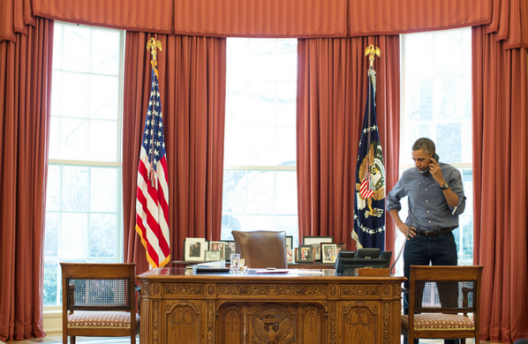 Ukraine has emerged as a test of Obama’s argument that, far from weakening American power, he has enhanced it through smarter diplomacy, stronger alliances and a realism untainted by the ideology that guided his predecessor. . . .
Ukraine has emerged as a test of Obama’s argument that, far from weakening American power, he has enhanced it through smarter diplomacy, stronger alliances and a realism untainted by the ideology that guided his predecessor. . . .
A president who has made clear to the American public that the “tide of war is receding” has also made clear to foreign leaders, including opportunists in Russia, that he has no appetite for a new one. . . .
“If you are effectively taking the stick option off the table, then what are you left with?” said Andrew C. Kuchins, who heads the Russia and Eurasia Program at the Center for Strategic and International Studies. “I don’t think that Obama and his people really understand how others in the world are viewing his policies.”
Rarely has a threat from a U.S. president been dismissed as quickly — and comprehensively — as Obama’s warning Friday night to Russian President Vladimir Putin. The former community organizer and the former Cold Warrior share the barest of common interests, and their relationship has been defined far more by the vastly different ways they see everything from gay rights to history’s legacy. . . .
From a White House podium late Friday, Obama told the Russian government that “there will be costs” for any military foray into Ukraine, including the semiautonomous region of Crimea, a strategically important peninsula on the Black Sea.
Within hours, Putin asked the Russian parliament for approval to send forces into Ukraine. The vote endorsing his request was unanimous, Obama’s warning drowned out by lawmakers’ rousing rendition of Russia’s national anthem at the end of the session. Russian troops now control the Crimean Peninsula.
There are rarely good — or obvious — options in such a crisis. But the position Obama is in, confronting a brazenly defiant Russia and with few ways to meaningfully enforce his threat, has been years in the making. It is the product of his record in office and of the way he understands the period in which he is governing, at home and abroad. . . .
Obama’s rejection of U.S. military involvement in Syria’s civil war, in which 140,000 people have died since he first called on President Bashar al-Assad to step down, is the leading example of his second term. So, too, is the Pentagon budget proposal outlined this past week that would cut the size of the army to pre-2001 levels.
Inside the West Wing, there are two certainties that color any debate over intervention: that the country is exhausted by war and that the end of the longest of its post-Sept. 11 conflicts is less than a year away. Together they present a high bar for the use of military force.
Ukraine has challenged administration officials — and Obama’s assessment of the world — again.
Image: President Barack Obama Talking on Phone with Russian President Vladimir Putin, March 1, 2014 (photo: Pete Souza/White House)
